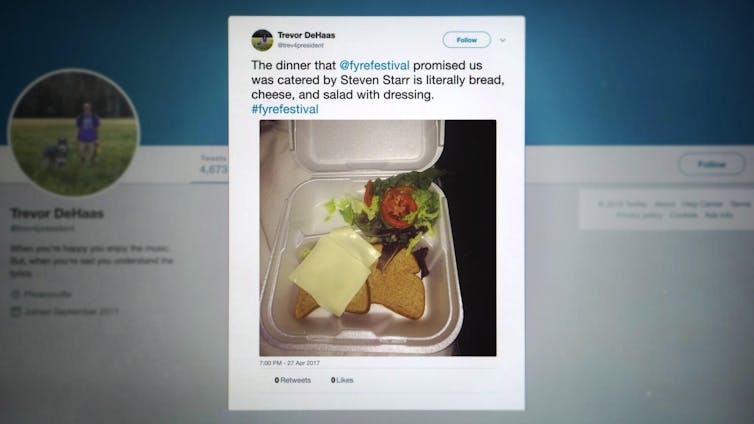Key Takeaway:
The founder of the 2017 Fyre Festival, William “Billy” McFarland, has announced plans for a second attempt at the festival, with a target date of the end of 2024. McFarland, who was charged with several fraud offences and sentenced to six years in prison, has been promoting the event on Instagram. The promotion is vague, making it difficult to prove the event’s success. Research shows that a quarter of cyber-crime victims have been scammed more than twice, and some victims are considered chronic fraud victims. The stakes for Fyre Festival II are higher, as a second offence could potentially result in a longer prison sentence for McFarland. The future of the festival remains uncertain, but it is unlikely that the new Fyre Festival will turn out like the first.
If you’ve ever been scammed, perhaps you resolved to never allow someone to take you for a fool again. But research shows not everyone reacts this way and in fact some fraud victims go into denial.
This might help explain why the founder of the disastrous 2017 Fyre Festival (a fraudulent luxury music festival), William “Billy” McFarland, has confidently announced plans for a Fyre Festival II.
The main organiser, McFarland, was charged with several fraud offences, sentenced to six years in prison and ordered to forfeit US$26 million (£20 million).
But about a year after his early release from prison, McFarland posted a video on Instagram about the launch of a second attempt at Fyre Festival. He said it has a target date for the end of 2024 but provided no information about who will perform.
At present, it is impossible to tell whether the new Fyre Festival will turn out like the first.
Ponzi’s legacy
Infamous fraudster Charles Ponzi’s story shows con artists who get caught often try again. Arriving in the US in 1903, Ponzi had US$2.50 in his pocket, having lost much of his savings to gambling.
Four years later, Ponzi was sentenced to three years in a Quebec prison for forging a check, and a few years later was sentenced an additional two years in an Atlanta prison for helping smuggle Italian immigrants into the US.
This did not stop Ponzi from starting his own company in 1920 and offering investors a return of 45% in 90 days, a time when banks were giving 5% a year. As some investors were paid on time with the promised interest, many more people joined the scheme. By the end of 1920, however, Ponzi was sentenced to five years in prison.

Many fraudsters — the best known is probably Bernie Madoff — have used the same technique to defraud millions of people. You might wonder why people use the same scam again and again. The simple answer is that schemes that promise extraordinary opportunities appeal to people.
They appeal to fraudsters, too. Ponzi managed to generate millions of dollars in less than a year, as did McFarland. Working a normal nine-to-five job — as McFarland’s release conditions require him to do — is unlikely to give him an income anywhere close to what he accumulated from Fyre Festival.
If you scam them, they will come: again and again
Fraudsters often create more refined plans when initial schemes fail.
In fact, there is a growing sense that scammers are becoming more sophisticated. Reports in the media have revealed that scammers started using AI technology, such as ChatGTP, to dupe people, even being able to imitate a person’s voice to fake a kidnapping event.
McFarland seems to have learned from his mistakes, but not perhaps in the way we would have hoped for. The promotion for Fyre Festival II is as vague as possible, which reduces the possibility that attendees will be able to sue him. It’s hard to prove someone has failed to deliver an event that, in McFarland’s words, is “everything I’ve been working towards”.
The publicity he has received from the Netflix documentaryabout the failed Fyre Festival, and invitations to present at international conferences after his prison release serve to provide McFarland with a sense of reassurance that people will, nevertheless, buy the tickets.
The 2017 failure doesn’t seem to have put people off. The first 100 tickets were put on sale for US$499 while future tickets will cost between US$799 – $7,999. Having checked the website, it seems that the first 100 tickets are sold out.
We may be able to understand McFarland’s actions and motivation. It is a bit more puzzling why people would buy tickets to a festival whose founder has gone to jail for defrauding ticket holders. That is, at least, until you read research about fraud victims.
A study into mass marketing online fraud found that a quarter of cyber-crime victims have been scammed more than twice.
A 2021 report indicates that some victims are considered chronic victims of fraud – they are hit time and time again.
It’s not possible to know for sure why people may have spent so much money on Fyre Festival II tickets. But the 2021 report found chronic fraud victims sometimes have recurring hope that next “opportunity” will work out. They may be in denial and refuse to admit they have been a victim of fraud, be motivated by a persistent need (such as status, companionship or to pay off debt), or struggle to see the link between their behaviour and the consequences.
The researchers found that while these factors may also apply to one-off victims, chronic fraud victims experience more intense emotional swings, as the temporary feelings of fulfilment are replaced with despair once the scam is exposed. This heightened despair makes them more vulnerable to future scams.
We cannot assume Fyre Festival II is a fraud. The stakes this time around are perhaps even higher as a second offence could potentially result in a longer prison sentence for McFarland.
Regardless, the law enforcement agencies will be watching closely. Will he be able to redeem himself or end up like Ponzi? We will know soon enough.





























